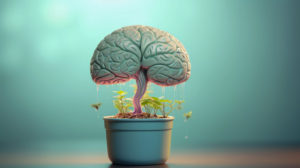Mental health is as crucial to our overall well-being as physical health, yet it often does not receive the same attention or care. Especially when it comes to feelings like persistent low mood or feelings of hopelessness- symptoms often associated with mental health conditions. It is vital to recognise the impact these have on daily life and the importance of seeking help. This blog explores why mental health matters, the implications of persistent low mood, and how seeking help, including exploring treatments like psychedelic-assisted therapy, may lead to a better quality of life.
Why mental health matters
Mental health influences how we think, feel, and behave in daily life. It also affects our ability to cope with stress, overcome challenges, build relationships, and recover from life’s setbacks and hardships. Good mental health isn’t just the absence of mental health problems. Rather than the absence of mental illness, mental health refers to the presence of positive characteristics.
The impact of persistent low mood
Persistent low mood can be debilitating, affecting all areas of life, including work, relationships, and physical health. People with low mood may experience constant feelings of sadness, emptiness, or hopelessness, and these feelings can make daily tasks and responsibilities feel insurmountable. Persistent low mood can also lead to withdrawals from social activities, decreased productivity, and increased susceptibility to physical illnesses due to weakened immune responses.
The stigma surrounding mental health
Despite its prevalence, there’s still a significant stigma attached to mental health issues. This stigma can prevent people from seeking help due to fear of judgement or misunderstanding by others. Overcoming this stigma is crucial, as it opens the door for more people to seek help and support without fear of discrimination.
The importance of seeking help
Recognising when to seek help is a critical step in taking control of one’s mental health. Treatment for persistent low mood typically involves a combination of therapy, medication, lifestyle changes, and support from family and friends. Here’s why seeking help is essential:
- Professional Diagnosis: A mental health professional can provide a thorough diagnosis, which is crucial for effective treatment.
- Tailored Treatment Plans: Mental health professionals can tailor treatment plans that address both the symptoms and underlying causes of persistent low mood.
- Support and Guidance: Therapy offers a safe space to explore feelings and learn coping strategies, while support groups provide a community of individuals with similar experiences.
Exploring psychedelic-assisted therapy as an alternative
For individuals who have tried conventional medications without sufficient relief, psychedelic-assisted therapy could be an alternative treatment option. Psychedelic-assisted therapy involves the use of psychedelic substances in a controlled, therapeutic setting. Studies suggest that when combined with therapy, psychedelics can provide an improvement in mood and outlook that are sometimes achieved faster than traditional medications.
Mechanism of Action: Psychedelics affect serotonin receptors in the brain, which can lead to altered states of consciousness. These experiences can provide patients with profound insights and a new perspective on their emotional experiences that can be therapeutic.
Evidence of Efficacy: Research indicates that psychedelic-assisted therapy can help reduce symptoms of hopelessness and low mood in some patients. This can be particularly beneficial for those who have found conventional treatments ineffective.
How to seek help
If you or someone you know is struggling with persistent low mood, here are some steps to begin addressing the issue:
- Acknowledge the Problem: Recognising that your feelings are valid and that it’s okay to seek help is the first step.
- Talk to Someone: Whether it’s a friend, family member, or mental health professional, talking can be a powerful first step towards recovery.
- Consult a Professional: Finding a therapist or counsellor who can provide professional guidance is crucial.
- Explore Treatment Options: Consider both conventional treatments and approaches like psychedelic-assisted therapy.
Mental health is a critical component of overall well-being, and addressing issues like persistent low mood is essential for maintaining life quality. By seeking help and exploring all available treatment options, including psychedelic-assisted therapy, individuals can improve their symptoms and gain the tools needed for coping with challenges. Remember, it’s okay to not be okay, and seeking help is a sign of strength, not weakness.
For more information about psychedelic-assisted therapy, you can get in touch with the GoodMind team today. Call us on 02 6190 0408 or email us at [email protected].





